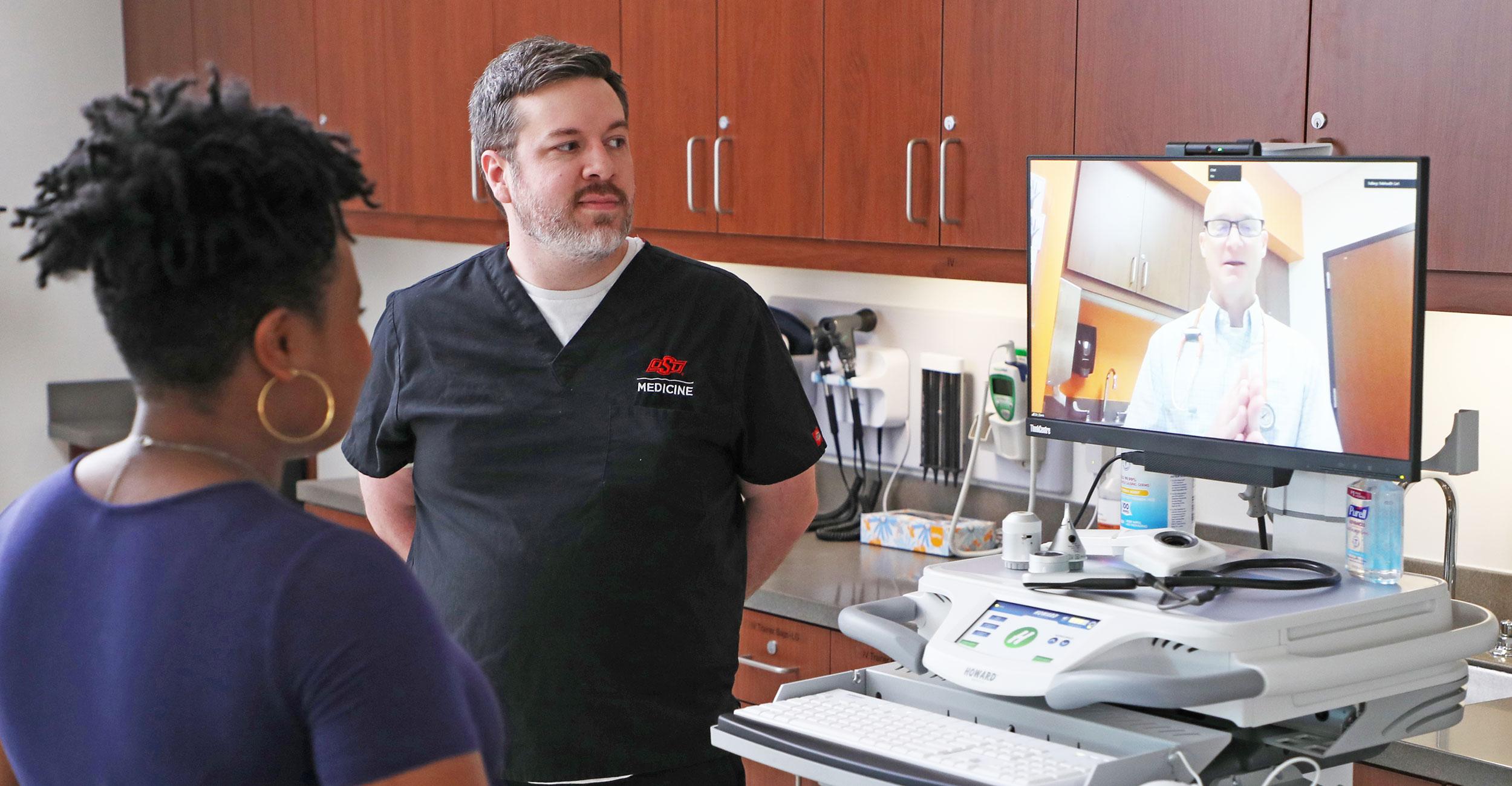
Expanding access to health care across Oklahoma
In order to bridge the gap of health care access that is much needed in Oklahoma, OSU Medicine is utilizing the latest technologies to bring the expertise of its physicians directly to rural hospitals across the state.
OSU Medicine is currently providing virtual behavioral health emergency room consults, as well as hospitalist services for McCurtain Memorial Hospital and Cleveland Area Hospital respectively. Emergency room behavioral care will also soon be available at Coal County General Hospital and Atoka County Medical Center, while virtual hospitalist services will soon be available in Sallisaw at Northeastern Health System Sequoyah. Tele-stroke services are now offered at hospitals in Anadarko, Fairfax and Stroud, while virtual cardiology services are ongoing with Choctaw Nation in Poteau.
“Oklahoma State University has been pioneering telehealth services for more than 25 years,” said Dr. Johnny Stephens, president of OSU Center for Health Sciences. “OSU continues to innovate as the leader in telehealth and virtual care, as technology continues to broaden the possibilities of reaching across the state to provide specialty care. Through these efforts, we are working to address both patient needs as well as health care workforce shortage issues.”
In addition to virtual care services, OSU Medicine is providing board-certified emergency medicine physicians to staff and manage the ER services at Cleveland Area Hospital and McAlester Regional Medical Center.
“Our push for quality has driven increased patient volume and acuity. The partnership with OSU, including having an emergency medicine physician onsite 24/7, has enhanced our clinical skill, professionalism, and stability,” said Edred Benton, CEO of Cleveland Area Hospital.
“OSU continues to innovate as the leader in telehealth and virtual care, as technology continues to broaden the possibilities of reaching across the state to provide specialty care. Through these efforts, we are working to address both patient needs as well as health care workforce shortage issues,” said Dr. Johnny Stephens, OSU Center for Health Sciences President.
During the first month of providing virtual care at McCurtain Memorial Hospital, OSU Medicine provided 21 emergency behavioral health appointments, half of which were addiction related. These services can be transformative as a solution to inpatient bed shortages.
“McCurtain Memorial Hospital and Oklahoma State University have partnered to help provide much needed tele-psychiatry services through the emergency room for our community. Every three years we perform a community health needs assessment, and mental health is always at the top of that list,” said Dr. David Bishop, ER physician and chief of staff at McCurtain Memorial Hospital. “Through this partnership patients can see a psychiatrist, and potentially begin treatment immediately. Mental health resources in rural communities have always been an area that has operated in a deficit compared to the public need, and through this partnership we hope to bridge that gap. OSU brings a level of care to our area that is second to none, and we are proud to be able to offer this service.”
According to a new study by the Healthy Minds Policy Initiative, over 56% of Oklahomans who needed mental health treatment didn’t get it in 2022, and Oklahoma’s supply of behavioral health professionals is well below national levels.
“The therapist and counselors spend a lot of time talking with the patients. I think this makes the patients feel heard and that someone truly wants to help them,” said Pam Jackson, emergency room director at McCurtain Memorial Hospital.
Seventy-five counties in Oklahoma are considered Health Professional Shortage Areas. While OSU is a leader in educating and returning physicians to practice in rural and underserved areas, the need is still great. Virtual care and telehealth services are vital to connecting Oklahomans to health services, Stephens said.
Launching in the fall will be a pilot project with 20 rural schools to provide urgent and behavioral care services. A telehealth cart will be on site with a stethoscope and otoscope and a high-definition camera. Clinicians will connect virtually to make a diagnosis and treat or assess patients for further care. Behavioral services will be provided via a familiar interface on an iPad.
Under the direction of Jared Droze and Dr. Bradley Anderson, OSU Medicine’s first director and medical director for virtual care respectively, additional projects launching soon include two mobile care units — one to provide primary care and the second to provide cardiology services which will travel to serve rural areas. Free virtual primary care clinics will also open in partnership with OSU Extension offices in select rural counties in southeastern Oklahoma this year. With Extension offices in all 77 counties, OSU is in a unique position to serve Oklahomans through those physical locations.
In addition to these expanded virtual care services and unique partnerships, the OSU Center for Health Sciences leverages its medical expertise via Project ECHO, a knowledge-sharing approach where expert teams lead virtual sessions for rural providers to help them deliver best-in-practice care to communities across the state. ECHO is free to participants and offers health care lines dedicated to congestive heart failure, behavioral medicine, hypertension management, diabetes, pediatric obesity and many more.
OSU Center for Health Sciences has also partnered with the Oklahoma Department of Mental Health and Substance Abuse Services to offer the Oklahoma Child and Adolescent Psychiatry and Mental Health Access Program, or OKCAPMAP. OKCAPMAP provides support to pediatric primary care and emergency department providers for the mental health needs of their patients. OKCAPMAP’s team consists of licensed mental health providers and board-certified child psychiatrists who provide consultation and referral assistance through OKCAPMAP’s phone line Monday-Friday 9 a.m. to 5 p.m. OKCAPMAP has 384 providers registered and have completed 499 consultations.